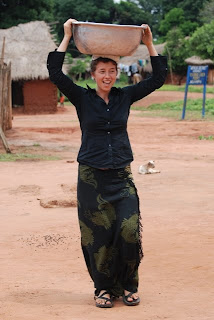DOUBLE BACKFLIP AWESOME TRIP. We managed to check off quite a number of typical India experiences:
- Filled out lots of paperwork. India sure likes paperwork for every occasion. And tea. Chai and paperwork at every turn.
- Traveled by rickshaw, taxi, train, car, foot...dodged cows, goats, dogs, and monkeys
- Leafed through dusty books at the IIT Delhi campus library
- Visited Humayon's tomb (wow...), Qutb Minar [jaw hits floor] and the iron pillar (modern day mystery, it's been standing 1600 years and hasn't rusted...supposedly scientists have been unsuccessful in duplicating the alloy)

Humayun's Tomb - didn't have camera, image stolen from here

Qutb Minar, I took 7,000 photos, it's absolutely stunning. And apparently attracts more visitors than the Taj Mahal
- Talked shop with some incredible social entrepreneurs
- Met a Bollywood Star (Shilpa Shukla from Chak De! India)
- Ate lots of home-cooked Indian food
- Ate lots of Indian food in roadside stalls (Chantar Mantar Dosa Wala in Delhi is fantastic)
- Ate in an American Diner
- Visited urban tuberculosis treatment micro centers in Muradabad
- Journeyed north to visit villages in the Kumaon region - foothills of the Himalayas
- Yoga (of course)
- Saw grassroots silk worm farming in action
- Received surprise aura healing by an Indian gentleman who earlier took two seconds to go from talking about uber-accounting to the importance of opening one's self like a flower to other people
- Followed our Sikh rickshaw driver on a tour through a Sikh temple
- Quested out to buy some tabla
- Dropped in on a surprise birthday party
- Swung through a night Bengali festival
- Decided that airports are always the worst part of the trip
Our trip originally had three main purposes:
1) Meet up with Avani. Avani does great work. For my Master's thesis, I'm working to help them with their plans to use pine needles to create electricity and high quality cooking fuel to mountain villages.
2) Meet up with Envergent. Honeywell is developing a flash pyrolysis process to convert biomass to electricity. They're interested in rural applications.
3) Meet up with Operation Asha. My advisor, Scott, volunteers with a foundation that works on fighting tuberculosis and they recently partnered with Operation Asha, a fiesty, innovative new tuberculosis organization.
wow. wow. wow.
Avani is incredible. They do so many things right. Imagine a Barefoot College Campus in the foothills of the Himalayas, 100% powered by renewable energy. Water is collected from rain and stored in multi-thousand gallon tanks. Local women dye silk and wool with natural colors and weave them into breathtaking patterns that are marketed and sold to wealthy consumers. Avani workers "leave their caste at the gate" and live, work, eat together. Extraordinarily delicious local ingredient food for every meal. It has all my favorite elements:
1) AWESOME people
2) Cash flow from outside into a rural community (usually money only trickles out as the poor by products, it's hard to find good examples of good cash flow coming in)
3) Renewable energy, eco-conscious (goes straight to my eco-puritan heart)
4) Heart-stopping scenery
5) Great food
I'm way too excited about the pine needle gasification project to stop and type about it now. It has so much potential I think about it non-stop these days.
I feel so blissfully lucky -- I met Rajnish (co-founder) and Chanchal (lead technician) at IDDS this summer. Then everything fell into place, almost of its own accord. It felt like one day I was bubbling to Scott about how great it would be to work with Avani on their gasification project, I blinked and we were riding up the twisty roads into the mountains of Uttarankhand.

Beautiful lady - all the women I saw in the mountains were stunning, especially the old ladies

Rice paddies on steep slopes

Avani silk worm farmer. All the leaves inside are crawling with silk worms.
Operation Asha is also beyond words. We met Sandeep and Shelly, the founders, and friends of SK. Incredible, wonderful, determined people. Thought it was about time to take a common sense approach to tuberculosis (TB) and they're producing impressive results after only a few years. They build up a network of treatment micro-centers that are accessible and open for long hours so that it's easier for TB patients to come by and take their medicine every day. It could be in a shop, or someone's home. It makes it much easier to reach patients in a cost effective way -- other tuberculosis programs typically spend $300/patient while Asha does a better job for $15/patient. I'll describe the Operation Asha strategy more in depth in a future blog entry, it's quite fantastic. (Their website is a bit clunky at the moment, but trust me, they're phenomenal.)
Yes, I liked India a lot.





